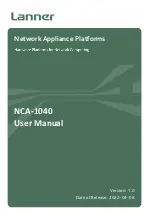
Responder time responder
U
SER
G
UIDE
354
number of errors (number of probe messages without reply)
percentage of packets lost
round-trip time in milliseconds: minimum/mean/maximum/standard deviation
timestamp at the end of service
The output is as follows:
root@Imola>
show rtr statistics
Response Time Reporter collected statistics:
Start Time: Thu Jan 1 01:30:35 CET 1970
60 probes transmitted, 60 probes received, 0 errors, 0% probe loss
round-trip min/avg/max/dev = 97.827/239.712/676.518/136.447 ms
Stop Time: Thu Jan 1 01:31:40 CET 1970
With the argument
status
the status of the RTR service is displayed as follows:
root@Imola>
show rtr status
Response Time Reporter 'rtr' is not running
RTR Responder is not running
IP
SLA
RESPONDER
It is possible to configure the router in order to replies to probes received using the commands:
rtr-responder <local-address> [<local-port>]
where local-address is the IP address of the router interface on which the packets are received by
the probe. The responder listens on two ports rooms:
supports the protocol on port 9998 RTR owner Tiesse (described in the previous paragraph).
You can configure the local port via the
local-port
parameter.
on the standard port 1967 protocol supports Cisco IP SLA.
In order to stop the responder service, the following command is used:
no-rtr-responder <local-address>
The responder functionality allows to execute measures of the following parameters:
Jitter
One Way Delay
Round Trip Delay
Packet Loss
The replies are in accordance with IP SLA-Source functions (IP SLA Querier) of Cisco‟s routers.
















































